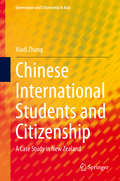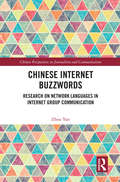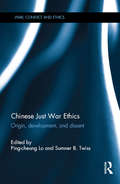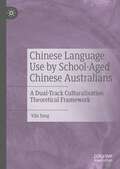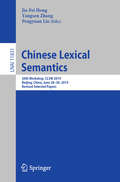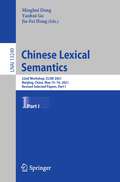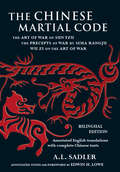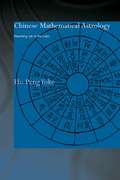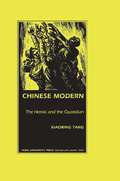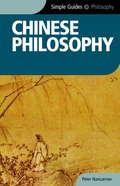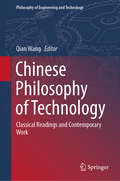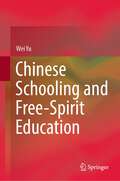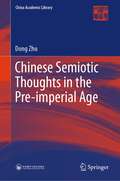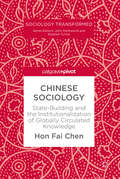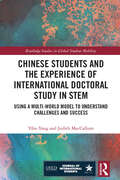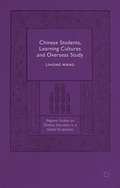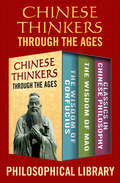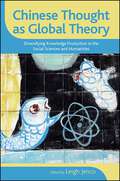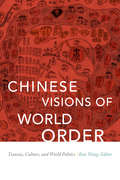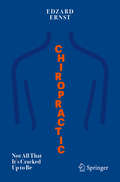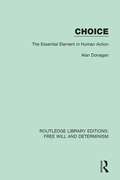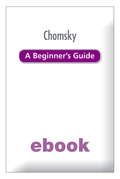- Table View
- List View
Chinese International Students and Citizenship: A Case Study in New Zealand (Governance and Citizenship in Asia)
by Xiudi ZhangThis book investigates how Chinese international students reconfigure their sense of themselves as citizens when they reflect on what Chinese citizenship means in the context of New Zealand. Adopting a case study approach, it develops a theory relating to the thoughts of Chinese international students; the theory is based on the communities, schools, family and state relationships of both their past and their contemporary daily experiences. It finds that the struggles of Chinese young people lie in between being individuals and submitting to the general will of the family, state and guanxi (a Chinese concept of interpersonal relationships). The book argues that the Western literature on citizenship is not sufficient in helping us understand how it is viewed in the Chinese contexts.It offers readers a picture of what citizenship means for Chinese young people and the role of citizenship education in Modern Chinese society, and demonstrates that the Chinese young people studied re-educated themselves on citizenship in a way that is unstable and emotional. This book makes important contributions to the literature on Chinese students who are studying abroad by going beyond the well-researched topics of academic and social experience to explore deeper understandings of each individual student’s relationship to family and the state in China and how the study abroad experience has developed new understandings of individual’s relationships to China, and new possibilities for contributing to Chinese society on return.
Chinese Internet Buzzwords: Research on Network Languages in Internet Group Communication (Chinese Perspectives on Journalism and Communication)
by Zhou YanAs the Internet has reshaped the way we communicate, people’s reading has become more fragmented and attention has been directed to a more concise and general form of language that outlines the most important information. This language of the internet, a language system that concentrates on the content of events and public emotions, has emerged and received wide currency. This monograph is one of the first books to examine the language of the internet in the Chinese context. By analysing content and discourse, the author examines Chinese website buzzwords since 2010. She reveals the mechanisms of generation, the cultural nature and political characteristics of the network language, analyzes the causes of its emergence and popularity, and highlights its social and academic significance. Meanwhile, she argues that research in the area is essentially interdisciplinary, involving not only perspectives from Journalism and Communication Studies, but also Philosophy, Culture, Linguistics and Sociology. Students and scholars of Communication Studies and Journalism, as well as Culture Studies should be greatly interested in this title.
Chinese Just War Ethics: Origin, Development, and Dissent (War, Conflict and Ethics)
by Ping-Cheung Lo Sumner B TwissThis book offers the first comprehensive analysis of warfare ethics in early China as well as its subsequent development. Chinese attitudes toward war are rich and nuanced, ranging across amoral realism, defensive just war, humanitarian intervention, and mournful skepticism. Covering the five major intellectual traditions in the "golden age" of Chinese civilization: Confucian, Daoist, Mohist, Legalist, and Military Strategy schools, the book’s chapters immerse readers in the proper historical contexts, examine the moral concerns in the classical texts on their own terms, reframe those concerns in contemporary ethical idioms, and forge a critical dialogue between the past and the present. The volume develops fresh moral interpretations of classical texts such as The Art of War, Mencius, Xunzi, Mozi, and the Daodejing and discusses famous philosophers such as Han Fei and Wang Yang-ming, representing antithetical schools of thought about warfare. Attention is also given to the military ethics of the People’s Liberation Army, examining its thinking against the backdrop of its own civilizational context. This book will be of much interest to students of just war theory, Chinese politics, ethics, and philosophy, military studies, and International Relations in general.
Chinese Language Use by School-Aged Chinese Australians: A Dual-Track Culturalisation Theoretical Framework
by Yilu YangThis book examines the use of Chinese by school-aged Chinese Australians from a dual-track culturalisation perspective. Drawing upon interviews, participant observations and documentary analysis, the author discusses why and how these children learn and use Chinese in multiple social settings, and how they construct their understanding of language and identities in doing so. The book will appeal to students and scholars in the fields of sociolinguistics, migration studies, sociology of education, language and communication amongst other areas in the social sciences.
Chinese Lexical Semantics: 20th Workshop, CLSW 2019, Beijing, China, June 28–30, 2019, Revised Selected Papers (Lecture Notes in Computer Science #11831)
by Jia-Fei Hong Yangsen Zhang Pengyuan LiuThis book constitutes the thoroughly refereed post-workshop proceedings of the 20th Chinese Lexical Semantics Workshop, CLSW 2019, held in Chiayi, Taiwan, in June 2019. The 39 full papers and 46 short papers included in this volume were carefully reviewed and selected from 254 submissions. They are organized in the following topical sections: lexical semantics; applications of natural language processing; lexical resources; corpus linguistics.
Chinese Lexical Semantics: 22nd Workshop, CLSW 2021, Nanjing, China, May 15–16, 2021, Revised Selected Papers, Part I (Lecture Notes in Computer Science #13249)
by Jia-Fei Hong Minghui Dong Yanhui GuThe two-volume proceedings, LNCS 13249 and 13250, constitutes the thoroughly refereed post-workshop proceedings of the 22nd Chinese Lexical Semantics Workshop, CLSW 2021, held in Nanjing, China in May 2021. The 68 full papers and 4 short papers were carefully reviewed and selected from 261 submissions. They are organized in the following topical sections: Lexical Semantics and General Linguistics; Natural Language Processing and Language Computing; Cognitive Science and Experimental Studies; Lexical Resources and Corpus Linguistics.
Chinese Martial Code
by A. L. Sadler Edwin LoweFor millennia the classics of Chinese martial strategy have been studied and their lessons applied with devastating success by warlords and military generals and today this timeless advice is analyzed as much for its application in the boardroom as on the battlefield-as thousands of Asian businessmen can attest.Chinese Martial Code provides clear, easy to follow translations of three of the most respected works on strategy in history, featuring a masterful translation of The Art of War of Sun Tzu--the most respected of all works of military strategy--as well as the less famous but equally wise Precepts of Ssu Ma Jang Chu and Wu Chi On the Art of War.Additionally, A. L. Sadler's translation is converted here into Pinyin for the first time and the original Chinese language versions of these classic texts are also included, making this title a treasure to Chinese history and military scholars as well. The text is also copiously annotated, placing its sage advice in perspective for modern readers planning to use these time-tested strategies to conquer the business world.
Chinese Mathematical Astrology: Reaching Out to the Stars (Needham Research Institute Series)
by Ho Peng YokeThough there are a number of well-written works on Chinese divination, there are none that deal with the three sophisticated devices that were employed by the Chinese Astronomical Bureau in the eleventh century and for hundreds of years thereafter. Chinese experts applied the methods associated with these devices to both weather forecasting and to the interpretation of human affairs. Hidden by a veil of secrecy, these methods have always been relatively little known other than by their names. The first work in any language to explore these three methods, known as sanshi (three cosmic boards), this book sheds light on a topic which has been shrouded in mystery for centuries, having been kept secret for many years by the Chinese Astronomical Bureau.
Chinese Metaphysics and Its Problems
by Chenyang Li Franklin Perkins Li, Chenyang and Perkins, FranklinThis volume of new essays is the first English-language anthology devoted to Chinese metaphysics. The essays explore the key themes of Chinese philosophy, from pre-Qin to modern times, starting with important concepts such as yin-yang and qi and taking the reader through the major periods in Chinese thought - from the Classical period, through Chinese Buddhism and Neo-Confucianism, into the twentieth-century philosophy of Xiong Shili. They explore the major traditions within Chinese philosophy, including Daoism and Mohism, and a broad range of metaphysical topics, including monism, theories of individuation, and the relationship between reality and falsehood. The volume will be a valuable resource for upper-level students and scholars of metaphysics, Chinese philosophy, or comparative philosophy, and with its rich insights into the ethical, social and political dimensions of Chinese society, it will also interest students of Asian studies and Chinese intellectual history.
Chinese Modern: The Heroic and the Quotidian
by Xiaobing TangChinese Modern examines crucial episodes in the creation of Chinese modernity during the turbulent twentieth century. Analyzing a rich array of literary, visual, theatrical, and cinematic texts, Xiaobing Tang portrays the cultural transformation of China from the early 1900s through the founding of the People's Republic, the installation of the socialist realist aesthetic, the collapse of the idea of utopia in the aftermath of the Cultural Revolution, and the gradual cannibalization of the socialist past by consumer culture at the century's end. Throughout, he highlights the dynamic tension between everyday life and the heroic ideal. Tang uncovers crucial clues to modern Chinese literary and cultural practices through readings of Wu Jianren's 1906 novel The Sea of Regret and works by canonical writers Lu Xun, Ding Ling, and Ba Jin. For the midcentury, he broadens his investigation by considering theatrical, cinematic, and visual materials in addition to literary texts. His reading of the 1963 play The Young Generation reveals the anxiety and terror underlying the exhilarating new socialist life portrayed on the stage. This play, enormously influential when it first appeared, illustrates the utopian vision of China's lyrical age and its underlying discontents--both of which are critical for understanding late-twentieth-century China. Tang closes with an examination of post-Cultural Revolution nostalgia for the passion of the lyrical age. Throughout Chinese Modern Tang suggests a historical and imaginative affinity between apparently separate literatures and cultures. He thus illuminates not only Chinese modernity but also the condition of modernity as a whole, particularly in light of the postmodern recognition that the market and commodity culture are both angel and devil. This elegantly written volume will be invaluable to students of China, Asian studies, literary criticism, and cultural studies, as well as to readers who study modernity.
Chinese Philosophy - Simple Guides
by Peter NancarrowTHIS BOOK WILL HELP YOU* to appreciate the variety, subtlety and wisdom of a unique philosophical tradition* to understand the major schools of thought that have shaped Chinese civilization* to draw on a rich cultural resource for different perspectives on questions of our time* to recognize traditional concepts that continue to inform Chinese thinking todayChina, an emerging superpower, is heir to an ancient civilization that owes little to outside influences. This compelling introduction to Chinese philosophy describes the major traditional schools of thought that continue to underpin much of Chinese thinking today. It includes an outline of the country's early history, and traces the development of Chinese thought, which evolved in a continuum and generally in isolation from the rest of the world, from the earliest concerns with ritual and divination until the arrival of Buddhism in the first century.The best known strand of Chinese philosophy is Confucianism, which is basically a philosophy of relationships between different levels in a hierarchy, from the ruler down to the individual. In complete contrast, the almost contemporary school of Laozi espoused the wisdom and freedom of the Dao, based on the concept of alignment with nature and reverence for the environment. There followed schools of analytical logic, Legalism, and the arrival of Buddhism, which became associated in China with the mystical writings of Laozi, adding the dimension of compassion. These schools gradually fused in a neo-Confucian synthesis that went unchallenged in China until the encounter with the West.The book touches on the relationship between philosophical thought and politics, and brings the reader up to date by looking at the considered way in which China has adapted foreign ideas in modern times. Written by a distinguished author in clear, everyday language, it is a fascinating and accessible introduction to an important subject.ACCESS THE WORLD'S PHILOSOPHIESSimple Guides: Philosophy is a series of concise introductions to the major philosophies of the world. Written by experts in the field, these accessible guides offer a fascinating account of the rich variety of arguments, ideas and systems of thought articulated by different cultures in the attempt to explore and define the nature of reality and the meaning, purpose and proper conduct of life. The Simple Guides will appeal to analytical thinkers and spiritual seekers alike. Taken together, they provide a basic introduction to the evolution of human thought, and a point of reference for further exploration and discovery. By offering essential insights into the world views of different societies, they also enable travellers to behave in way that fosters mutual respect and understanding.
Chinese Philosophy of Technology: Classical Readings and Contemporary Work (Philosophy of Engineering and Technology #34)
by Qian WangThis book gathers essays that introduce the ideological advances in the philosophy of engineering and technology in contemporary China. It particularly focuses on China’s distinctive concepts and methods, revealing different views and academic debates to offer readers a comprehensive overview of this important field.The contributors present unique perspectives based on practical problems and traditional philosophy, examining such issues and concepts as axiology and theories of process, the difference between engineering activities and technology activities, and the core of the relationship between “Dao” and “Technique.”Other essays cover the ethics of technology, practical wisdom (phronesis) and practical reasoning, as well as creative concepts and methods concerning the philosophical problems in high technology, architectural technology, and technological innovation. The authors also consider more general issues in the field.This book compiles the relevant research achievements of Chinese scholars in various time periods. Some authors have revised and translated into English papers published in Chinese, while others present their research in English specifically for this study. An annotated bibliography of the major publications in the field completes this collection.
Chinese Schooling and Free-Spirit Education
by Wei YuReaching deep into the wealth of Chinese philosophical wisdom, this book offers rich insights into a way of educating that has found staunch advocates among educators through the ages. The ‘free-spirit education’, which calls on educators to respect and nurture the natural goodness of each child, affords an educational principle that is embedded in one of the most important Confucian classics: The Doctrine of the Mean. This book analyzes the meaning, history, principles, and educational application of ‘free-spirit education’ and also explores its contemporary development in the context of a school improvement initiative. It introduces the intellectual origins of ‘free-spirit education’, the application in ’process-based inductive teaching’ and cases from the field. It presents the collection of pedagogical cases that are rooted in the traditions of Chinese philosophic inquiry and viewed through the lens of contemporary pedagogy for human development. This book is a useful reference for university faculty, educational researchers, school teachers and leaders, graduate and undergraduate students in curriculum studies and in philosophy, social science, and education, curriculum developers, and all those educators who are interested in understanding ‘free-spirit education’—a key component of the humanistic traditions of Chinese education.
Chinese Semiotic Thoughts in the Pre-imperial Age (China Academic Library)
by Dong ZhuThis book examines practices on the relationship between sign and meaning in the Pre-Imperial period of China from the semiotics perspective. Although the Chinese civilization did not develop a comprehensive semiotics system in that period, they are highly semiotic in many ways. The thinking and application of signs of Chinese people can be found in many classics, such as The Book of Changes, The Analects of Confucius, Tao De Jing and Zhuangzi. This book begins its study by re-examining the semiotic thoughts contained in The Book of Changes and inquiries into the thoughts of the major philosophers of different schools. It provides insights into the findings of these philosophers concerning the relationship between sign and meaning. In particular, it concentrates on how the prosperity of the various contending semiotic thoughts complemented each other in forming a sign system. In addition, the book also emphasizes the wholeness and associativity of observing things and studying relevant signs of Chinese people. As the first monograph in any language to systematically summarize Chinese semiotic thought in the Pre-Imperial period, this book helps promote understanding of the traditional Chinese culture and mindset.
Chinese Sociology: State-Building and the Institutionalization of Globally Circulated Knowledge (Sociology Transformed)
by Hon Fai ChenThis book examines the institutional development of Chinese sociology from the 1890s to the present. It plots the discipline's twisting path in the Chinese context, from early Western influences; through the institutionalization of the discipline in the 1930s-40s; its problematic relationship with socialism and interruptions under Marxist orthodoxy and the Cultural Revolution; its revival during the 1980s-90s; to the twin trends of globalization and indigenization in current Chinese sociological scholarship. Chen argues that in spite of the state-building agenda and persistent efforts to indigenize the discipline, the Western model remains pervasively influential, due in large part to the influence of American missionaries, foundations and scholars in the formation and transformation of the Chinese sociological tradition. The history of Chinese sociology is shown to be a contingent process in which globally circulated knowledge, above all the American sociological tradition, has been adapted to the changing contexts of China. This engaging work contributes an important country study to the history of sociology and will appeal to scholars of Chinese history and disciplinary historiography, in addition to social scientists.
Chinese Students and the Experience of International Doctoral Study in STEM: Using a Multi-World Model to Understand Challenges and Success (Routledge Studies in Global Student Mobility)
by Yibo Yang Judith MacCallumThis volume examines the diversified and challenging experiences of Chinese international STEM doctoral students at Australian institutes of higher education, exploring how intersections between research, personal life and social experiences can be negotiated to achieve academic success and personal transformation. By drawing on a range of qualitative and longitudinal research methods, the book foregrounds student narratives and utilizes a novel three-dimensional multi-world framework as an effective approach for understanding student experiences in a holistic way. It integrates Chinese philosophical perspectives and theories in the fields of educational psychology, international education, and doctoral education to interpret nuances, complexity, and particularities of the cross-cultural STEM PhD experience, highlighting the importance of the supervisor-mentee relationship and the role of students’ cultural, social, and philosophical values in supporting their successful completion of the PhD. The analysis thus provides new insights into the ways in which these experiences vary across students, and might apply in other national contexts, and to non-STEM student cohorts. This book will be a valuable resource for researchers and academics engaged in cross-cultural education, the sociology of education, and international and comparative education. It will be of particular interest to those with a focus on international doctoral education and cultural Asian studies.
Chinese Students, Learning Cultures and Overseas Study (Palgrave Studies on Chinese Education in a Global Perspective)
by Lihong WangThis book focuses on the phenomenon of Chinese postgraduate students studying abroad and depicts their learning trajectory as they adjust to a new culture of teaching and learning in a new environment. It uses an example from a British university to draw together intercultural learning theories to explore the impact that studying abroad has.
Chinese Thinkers Through the Ages: The Wisdom of Confucius, The Wisdom of Mao, and Classics in Chinese Philosophy
by Philosophical LibraryFrom the I Ching to The Little Red Book: Two thousand years of wisdom from some of China&’s greatest philosophers and political thinkers.The Wisdom of Confucius: Whether considering his own life, human nature, or a society&’s responsibilities, Confucius&’s teachings emphasize morality, social relationships, justice, and sincerity. He pursued social and political reform, leaving a legacy of wisdom that remains vital today. Organized by topic and accompanied with contextual footnotes, this collection of quotations and lessons is often as entertaining as it is educational. The Wisdom of Mao: In this collection of essays, China&’s Chairman Mao Tse-Tung explains his interpretation of Marxism-Leninism that became known as Maoism. From examining the root causes of societal shifts to explaining the necessity of guerilla-based revolution, Mao mixes his philosophical positions with the history of the Chinese people.Classics in Chinese Philosophy: An anthology of the most important philosophical texts in Chinese history, from Confucius and the I Ching to Mao Tse-Tung and Yu-Lan Fung.
Chinese Thought as Global Theory: Diversifying Knowledge Production in the Social Sciences and Humanities (SUNY series in Chinese Philosophy and Culture)
by Leigh JencoWith a particular focus on Chinese thought, this volume explores how, and under what conditions, so-called "non-Western" traditions of thought can structure generally applicable social and political theory. Reversing the usual comparison between "local" Chinese application and "universal" theory, the work demonstrates how Chinese experiences and ideas offer systematic insight into shared social and political dilemmas. Contributors discuss how medieval Chinese understandings of causal heterogeneity can relieve impasses within contemporary historiography, how current economic and social conditions in China respond proactively to the future configuration of world markets, and how hybrid modes of cross-cultural engagement offer new foundations for the enterprise of learning from cultural others. Each chapter works from Chinese perspectives to theorize the location of knowledge, its conditions of production, and the modes through which its content or adequacy is legitimated, challenged, and sustained. Rather than reproducing Eurocentric knowledge production in Chinese form, the mobilization of Chinese thought as a generally applicable body of theory actually breaks down clear boundaries between Chinese and non-Chinese thought.
Chinese Visions of World Order: Tianxia, Culture, and World Politics
by Ban WangThe Confucian doctrine of tianxia (all under heaven) outlines a unitary worldview that cherishes global justice and transcends social, geographic, and political divides. For contemporary scholars, it has held myriad meanings, from the articulation of a cultural imaginary and political strategy to a moralistic commitment and a cosmological vision. The contributors to Chinese Visions of World Order examine the evolution of tianxia's meaning and practice in the Han dynasty and its mutations in modern times. They attend to its varied interpretations, its relation to realpolitik, and its revival in twenty-first-century China. They also investigate tianxia's birth in antiquity and its role in empire building, invoke its cultural universalism as a new global imagination for the contemporary world, analyze its resonance and affinity with cosmopolitanism in East-West cultural relations, discover its persistence in China's socialist internationalism and third world agenda, and critique its deployment as an official state ideology. In so doing, they demonstrate how China draws on its past to further its own alternative vision of the current international system. Contributors. Daniel A. Bell, Chishen Chang, Kuan-Hsing Chen, Prasenjit Duara, Hsieh Mei-yu, Haiyan Lee, Mark Edward Lewis, Lin Chun, Viren Murthy, Lisa Rofel, Ban Wang, Wang Hui, Yiqun Zhou
Chiranjiv Manus: चिरंजीव माणूस
by Narayan Desaiसर्व मराठी माणसांनी, नव्हे, सर्व भारतीयांनी वाचावे आणि त्यावर मनन करावे अशी जी काही महत्त्वाची पुस्तके जगात निर्माण झाली त्यात “Eternal Man” या पुस्तकाची गणना करावी लागेल. शेवटी माणसामधल्या माणूसकीची जपणूक केली पाहिजे हे सांगणारे जे तत्त्वज्ञान त्याचाच एका वेगळ्या पद्धतीने या पुस्तकात विचार झालेला आहे. एवगेनी बोगात यांच्या Eternal Man या पुस्तकाचा संक्षिप्त भावानुवाद श्री. नारायण देसाई यांनी केला आहे. माणसातील माणूस हा नेहमीच चिरंजीव असतो. तो अमर असतो, तो कधीच नाश पावत नाही हे या तत्त्वचिंतनाच्या मागील मुख्य सूत्र आहे. आणि या सूत्राचे माणासाला-मराठी माणसाला-आकलन झाले तर त्याच्यामधील निराशावाद नाहीसा झाल्यावाचून राहणार नाही.
Chiropractic: Not All That It's Cracked Up to Be
by Edzard ErnstOf all forms of alternative medicine, chiropractic is the one that is most generally accepted. In the UK, for instance, chiropractors are regulated by statute and even have their own ‘Royal College of Chiropractic’. In the US, chiropractic’s country of origin, most chiropractors carry the title ‘doctor’ and many consumers believe they are medically trained. Despite this high level of acceptance, chiropractic is wide open to criticism. The claims and assumptions made by chiropractors are far from evidence based. Chiropractic manipulations are of doubtful effectiveness and have regularly been associated with severe adverse effects, including multiple fatalities. The advice issued by chiropractors to patients and consumers is often less than responsible. The behaviour of chiropractors and their organisations is frequently less than professional. This book presents and discusses recent evidence in and around chiropractic in a factual and unemotional manner. It amounts to an evidence-based critique of this profession and discloses the often dangerously misleading information published for the lay audience. It thereby contributes to advancing public health and critical thinking.
Choice: The Essential Element in Human Action (Routledge Library Editions: Free Will and Determinism #2)
by Alan DonaganThis book, first published in 1987, investigates what distinguishes the part of human behaviour that is action (praxis) from the part that is not. The distinction was clearly drawn by Socrates, and developed by Aristotle and the medievals, but key elements of their work became obscured in modern philosophy, and were not fully recovered when, under Wittgenstein’s influence, the theory of action was revived in analytical philosophy. This study aims to recover those elements, and to analyse them in terms of a defensible semantics on Fregean lines. Among its conclusions: that actions are bodily or mental events that are causally explained by their doers’ propositional attitudes, especially by their choices or fully specific intentions; that choice cannot be reduced to desire and belief, and hence that the traditional concept of will as intellectual appetite must be revived.
Chomsky A Beginner's Guide
by Michael DeanThis informative text explores: Chomsky's linguistic theory from the groundbreaking Syntactic Structures to the present day; his ideas on child language acquisition and what they all mean to us; his theory of the mind and how it led us to see ourselves as thinking individuals; his fight for human rights; and more.
Chomsky A Beginner's Guide (ABEG)
by Michael DeanThis informative text explores: Chomsky's linguistic theory from the groundbreaking Syntactic Structures to the present day; his ideas on child language acquisition and what they all mean to us; his theory of the mind and how it led us to see ourselves as thinking individuals; his fight for human rights; and more.
